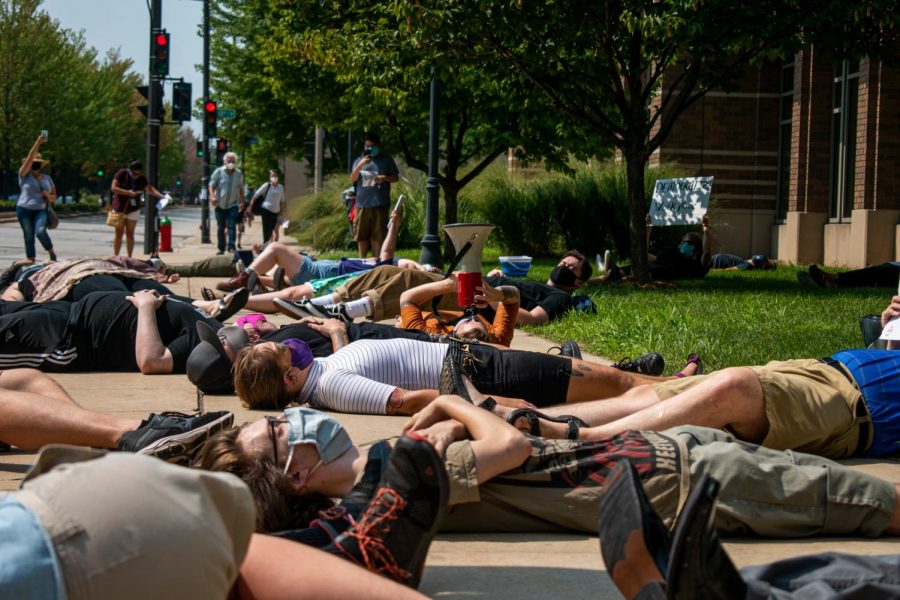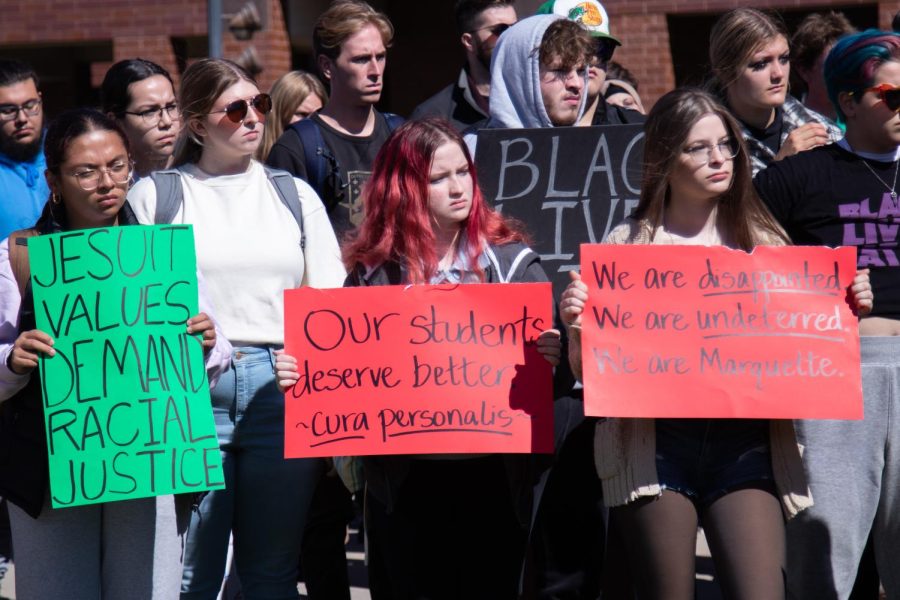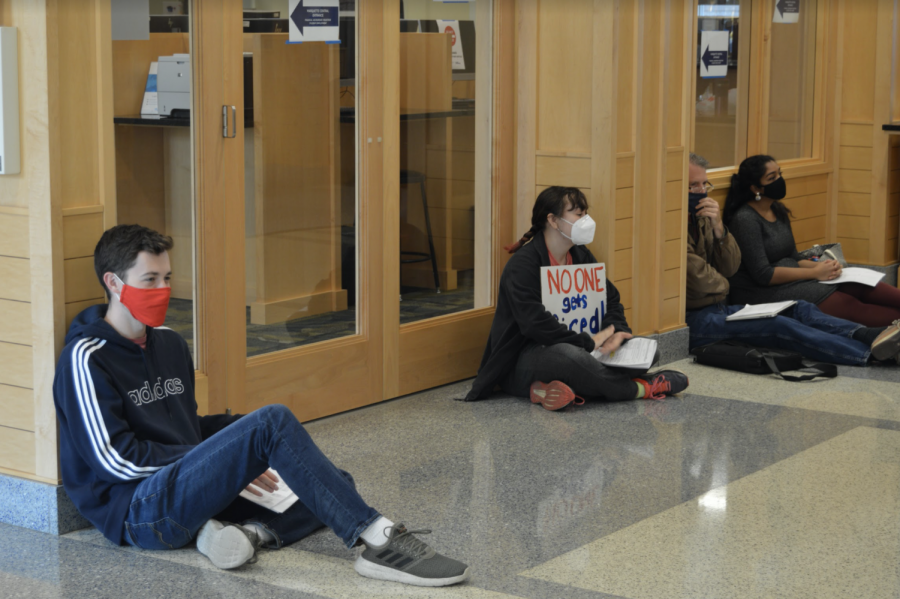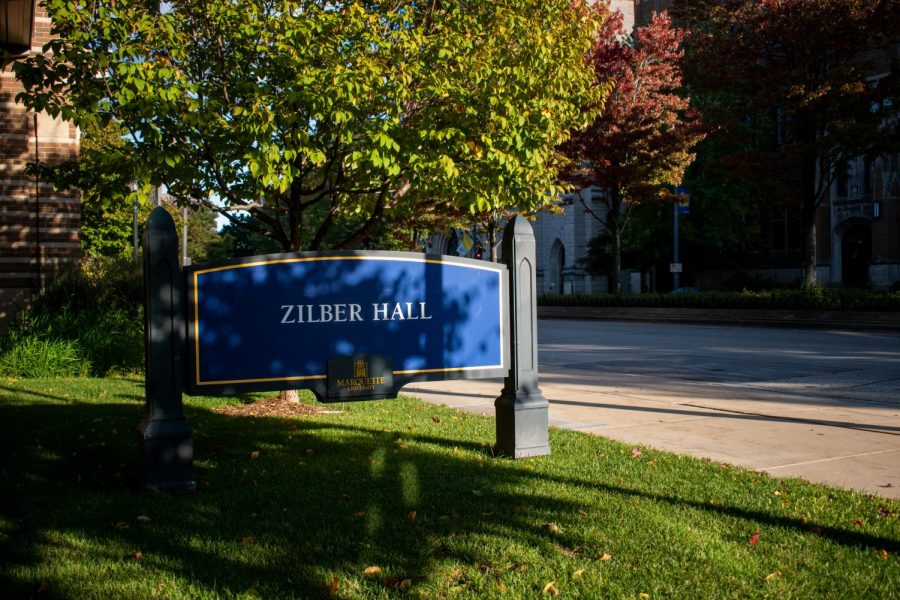“We are not going to stay quiet.”
Temperatures rising above 90 degrees didn’t stop the Marquette University Workers Union from organizing a “die-in” demonstration Aug. 26, the first day of classes.
Makeshift gravestones decorated the lawn in front of the building, reading “If I die I want our admin to dig the hole” and “Killed for profit.”
Nearly 30 community members — many of them graduate student workers — gathered outside of Zilber Hall to protest the university’s reopening plan for the fall semester.
Those present had several main requests. First, to give instructors the choice to teach classes online. Second, for union recognition. Third, to involve professors in the decision process regarding budget cuts and furloughs. Fourth, that the university lives up to its plan for racial justice.
Melady Elifritz, a graduate student worker in the philosophy department, called Marquette’s reopening plan an “institutional failure.” COVID Cheq, Marquette’s mandatory symptom tracker and self-assessment, puts responsibility on individual students rather than the university itself, Elifritz said.
“I fear they are going to use that to later blame students when we have a big outbreak,” she said.
Bentley Kennedy-Stone, a PhD student, pointed out that COVID Cheq may not be what it seems.
“Every single morning we sign away our right to operate a class-action lawsuit against the university,” he said. “It basically transfers the liability … onto ourselves as individuals.”
Tyler Reaker, a graduate student and teaching assistant in the College of Engineering, said instructors should have the option to choose between online and in-person classes.
“Ask grad students and as non-tenure track professors, we have very little choice (as to) whether we teach in the classroom and online,” Reaker said. “Since we are the ones being put at risk for catching coronavirus … we should have that choice.”
Graduate students are given a $375 stipend per semester to cover health care costs.
Juniper Colwell, a graduate student worker in the philosophy department, voiced concern for the well-being of the Milwaukee community, which doesn’t have a choice when it comes to interacting with students on the street and at bus stops.
“(The university) doesn’t have to bear any responsibility for anything that happens to anyone not directly related to the university, despite the fact they are bearing a lot of the harm,” Colwell said. “It shows a lot of irresponsibility … the university has completely ignored the fact that we are not the only ones affected by this.”
“I hope (administration) sees they are putting people’s’ lives at risk by doing this,” Reaker said. “There is a consequence for their actions.”
Elifritz also said Marquette’s reopening plan contradicts its Jesuit values.
“If ‘cura personalis’ is about caring for the whole person, the whole person should include their health and safety and well-being,” she said.
“(Marquette) claims to be all about the people and putting the community first … they are putting profits before people,” Reaker said.
Jonathan Jimenez, a senior in the College of Education, said he attended the protest to show his solidarity. He called Marquette’s actions “despicable” and “heartbreaking.”
University spokesperson Chris Stolarski sent a statement regarding the protest.
“The health, safety and well-being of our students, faculty, staff and visitors is of the utmost importance to Marquette. To help mitigate the spread of COVID-19, we are opening in a hybrid learning model with fewer students living residentially. Our reopening plan – developed in close coordination with public health experts – was approved by the Milwaukee Health Department,” the statement said.
It cited precautions such as daily symptom screening, mandatory mask-wearing, free on-campus testing for students without symptoms, enhanced cleaning protocols, de-densification efforts, a community pledge and “a mixture of face-to-face, hybrid and online instruction.”
“Our phased approach provides the flexibility to continuously monitor the latest developments and guidance while still providing the personalized, on-campus academic and cocurricular experience that is foundational to our Catholic, Jesuit education.”
Prior to the Aug. 5 announcement that Marquette would be reopening for the Fall 2020 semester, the Marquette University Workers Union sent out a survey to grad student workers and NTT faculty.
Sarah Kizuk, a graduate student worker, shared some of the results.
Many expressed that they did not feel safe returning to campus, and did not feel like they were given the opportunity to voice concerns and ask questions publicly and directly to administration. Some said they’d like to see unionization, health insurance for NTT and graduate students, and the option to choose to teach remotely, among other things.
“People will die,” Elifritz said. “Whether it’s us, whether it’s our families, (whether) it’s the Milwaukee community.”
Benjamin Wells contributed to this report.
This story was updated Aug. 31.
This story was written by Alexa Jurado. She can be reached at alexa.jurado@marquette.edu.





